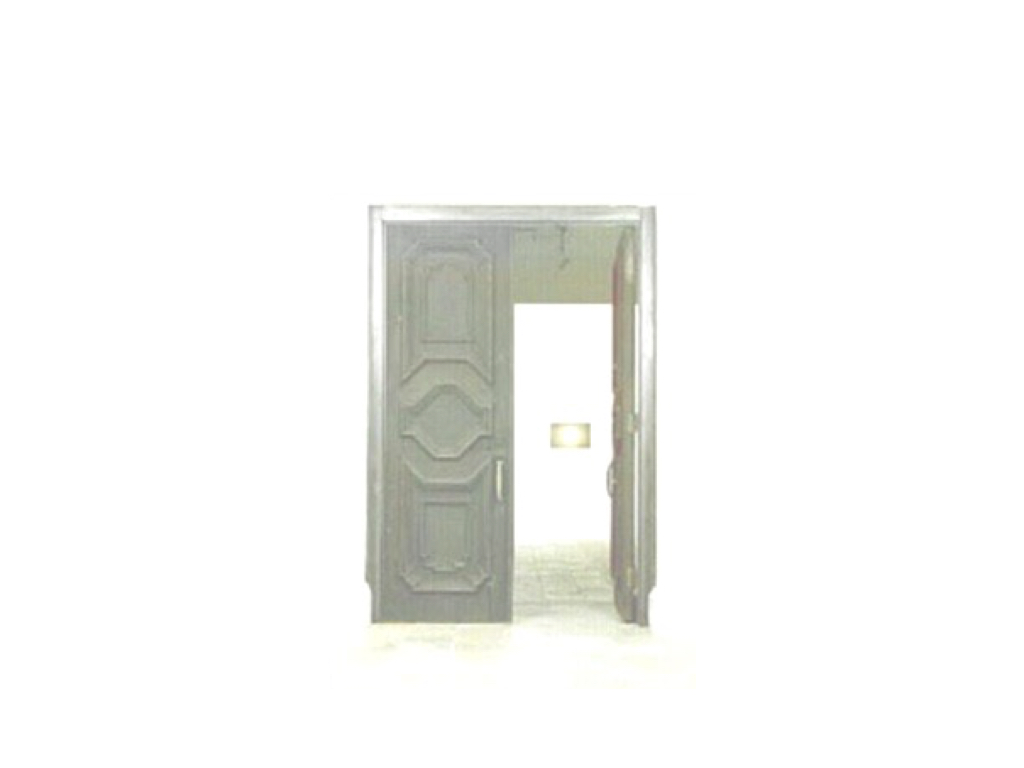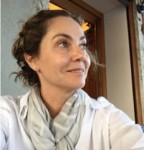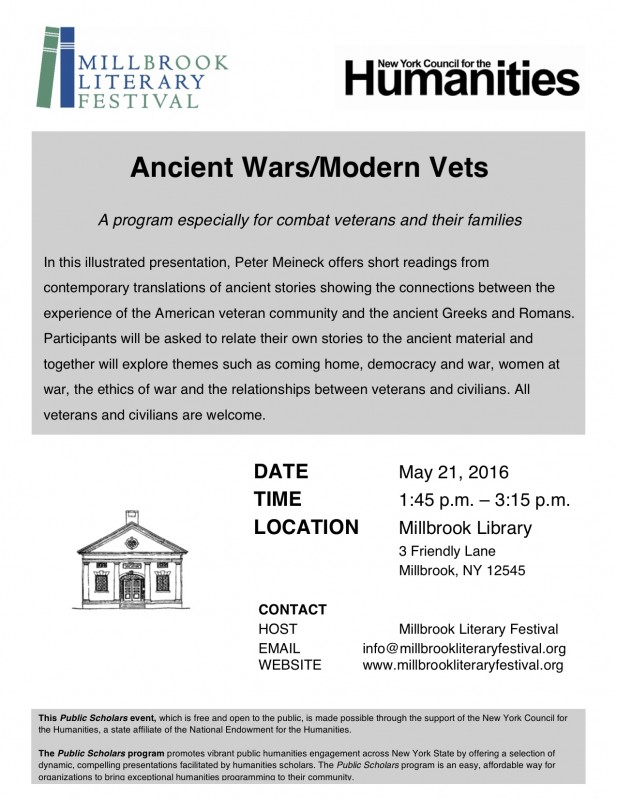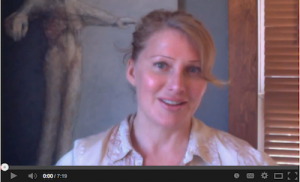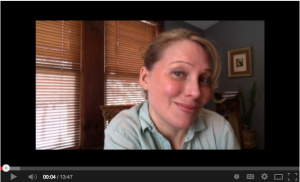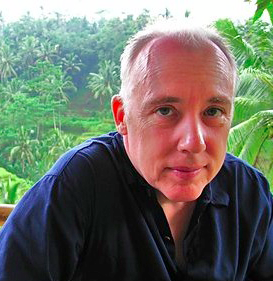 Donald Favareau is an Associate Professor at the University Scholars Programme, National University of Singapore, where he developed and has been teaching since 2004 Asia’s first university-level course on Biosemiotics. Co-Founder and Vice-President of the International Society for Biosemiotic Studies since 2005, his work explores both the natural foundation of sign processes in living systems, as well as the history of scientific thinking about such processes. Continue reading “Don Favareau selected as 2023 Science-Art Researcher”
Donald Favareau is an Associate Professor at the University Scholars Programme, National University of Singapore, where he developed and has been teaching since 2004 Asia’s first university-level course on Biosemiotics. Co-Founder and Vice-President of the International Society for Biosemiotic Studies since 2005, his work explores both the natural foundation of sign processes in living systems, as well as the history of scientific thinking about such processes. Continue reading “Don Favareau selected as 2023 Science-Art Researcher”
Dactyl Art-Science researcher J. Augustus Bacigalupi on Quant/Qual
J. A. Bacigalupi (2020); Evolving Ethnographies: Problematizing Social Practice via Interactive Installations and Human Habits of Alienation sentientartworks.com/science
Marcella Faria at the Stellenbosch Institute for Advanced Study
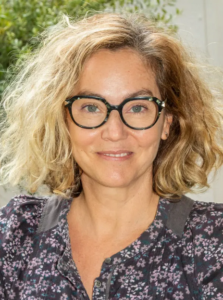 Marcella Faria, Dactyl Foundation art-science researcher, began a fellowship at SIAS in Stellenbosch, South Africa this month. Her project, Cell stories: how key are the words? investigates connections between cell biology and literary forms.
Marcella Faria, Dactyl Foundation art-science researcher, began a fellowship at SIAS in Stellenbosch, South Africa this month. Her project, Cell stories: how key are the words? investigates connections between cell biology and literary forms.
While at STIAS, Faria will identify potential overlaps between ‘cell biology terms’, historical facts and literary pieces of the last century. Her hypothesis is that by mapping the common metaphors, a narrative will emerge “starting with borders and identity, progressing into contact and recognition, and eventually developing into connection and networking.” She will also investigate the extent to which the history of the term ‘cell’ grasps essential features and mechanisms of life itself.
She notes that biology and language are complex systems in which the emerging properties have to do with the organisation of the parts. Both systems are based on arbitrary codes that produce selective meaning. Despite the natural hierarchies and repetitions, the systems are not predictable with their behaviour adapting to context by different connections and feedback loops due to the undetermined nature of semiosis itself.
Meagen Youngdahl, 2019 Dactyl Scholar, completes project
 Meagen Youngdahl, a poet who has served as a Dactyl Scholar working in the intersections of art and science, has completed a creative non-fiction piece entitled, “Moving with care: a biosemiotic, narrative inquiry into (in)fertility and bodymind wellness,” which adds a new dimension to semiotics scholarship and to poetry.
Meagen Youngdahl, a poet who has served as a Dactyl Scholar working in the intersections of art and science, has completed a creative non-fiction piece entitled, “Moving with care: a biosemiotic, narrative inquiry into (in)fertility and bodymind wellness,” which adds a new dimension to semiotics scholarship and to poetry.Continue reading “Meagen Youngdahl, 2019 Dactyl Scholar, completes project”
Joshua Augustus Bacigalupi selected as 2020 Dactyl Researcher in Art & Science
 Joshua Bacigalupi is a Social Researcher and Public Designer whose vocation is to understand how people and their environments maintain vitality and thrive on this planet. Throughout his life, the synthesis of both artistic (qualitative) and scientific (quantitative) approaches ground this exploration. Towards these ends, as an undergraduate, Joshua studied environmental science and physical chemistry at UC Santa Barbara. To better understand the nexus between complex social and physical systems, he went on to study architecture earning a MArch from the University of Colorado, Denver, and studied municipal and urban space design in Finland and Italy. Upon return, Joshua served as head designer for the flagship District no.1 police station in Denver that earned AIA and industry design awards. And, in 2002, he founded the residential design practice, BacigalupiWorks.
Joshua Bacigalupi is a Social Researcher and Public Designer whose vocation is to understand how people and their environments maintain vitality and thrive on this planet. Throughout his life, the synthesis of both artistic (qualitative) and scientific (quantitative) approaches ground this exploration. Towards these ends, as an undergraduate, Joshua studied environmental science and physical chemistry at UC Santa Barbara. To better understand the nexus between complex social and physical systems, he went on to study architecture earning a MArch from the University of Colorado, Denver, and studied municipal and urban space design in Finland and Italy. Upon return, Joshua served as head designer for the flagship District no.1 police station in Denver that earned AIA and industry design awards. And, in 2002, he founded the residential design practice, BacigalupiWorks.Continue reading “Joshua Augustus Bacigalupi selected as 2020 Dactyl Researcher in Art & Science”
Meagen Youngdahl, named 2019 Dactyl Scholar in Art and Science
Meagen Youngdahl has been named Fall 2019 Dactyl Scholar. Youngdahl is a multi-genre writer and a doctoral candidate in Creative Writing at the University of Kansas. She holds a BA in English and Film Studies from UC Berkeley and an MA in Creative Writing from UC Davis. Her work, which is influenced by her ongoing research in (bio)semiotics, aims to challenge boundaries between critical and creative writing and thought.
She will be working on a creative non-fiction project exploring the intersections of poetics and biosemiotics, specifically through the work of 2009 Dactyl Essay Award recipient, Wendy Wheeler.
Victoria Alexander Receives Fulbright U.S. Scholar Award to Russia
 The U.S. Department of State and the J. William Fulbright Foreign Scholarship Board are pleased to announce that Victoria Alexander with Dactyl Foundation in New York, has received a Fulbright U.S. Scholar Program award to St Petersburg, Russia. Alexander will conduct research and lecture at ITMO University in the Digital Humanities Lab as part of a project: The Poetics of Science: How Biosemiotics helps us understand living systems, evolution, creativity, and language.
The U.S. Department of State and the J. William Fulbright Foreign Scholarship Board are pleased to announce that Victoria Alexander with Dactyl Foundation in New York, has received a Fulbright U.S. Scholar Program award to St Petersburg, Russia. Alexander will conduct research and lecture at ITMO University in the Digital Humanities Lab as part of a project: The Poetics of Science: How Biosemiotics helps us understand living systems, evolution, creativity, and language.
Alexander is one of over 800 U.S. citizens who will teach, conduct research, and/or provide expertise abroad for the 2019-2020 academic year through the Fulbright U.S. Scholar Program. Recipients of Fulbright awards are selected on the basis of academic and professional achievement, as well as record of service and demonstrated leadership in their respective fields. Continue reading “Victoria Alexander Receives Fulbright U.S. Scholar Award to Russia”
Annual Biosemiotics Gathering at Berkeley, CA June 2018
 This is a rare opportunity for Americans to attend the Biosemiotics annual conference. Usually held in Europe, it will be held in California this spring.
This is a rare opportunity for Americans to attend the Biosemiotics annual conference. Usually held in Europe, it will be held in California this spring.
Call for Papers
18th Annual Biosemiotics Gathering, Berkeley, California, June 17-20, 2018
The Scientific Advisory Committee of the 18th Gathering in Biosemiotics is pleased to invite scholars to submit abstracts on the fundamental mechanisms of meaning-making (semiosis) in living systems
Marcella Faria, Dactyl 2017 visiting researcher, publishes on bio-poetics
 Over the course of 2017, Marcella Faria has been working at Dactyl Foundation as a visiting researcher in art-science topics. We are pleased to announce the publication of her article, “Aggregating, Polarizing, Networking – The Evolution of Cell Adhesion Codes” in BioSystems.
Over the course of 2017, Marcella Faria has been working at Dactyl Foundation as a visiting researcher in art-science topics. We are pleased to announce the publication of her article, “Aggregating, Polarizing, Networking – The Evolution of Cell Adhesion Codes” in BioSystems.
This research explores how complex multi-cellular life began simply by cells being able to stick together, with one side facing the extracellular world and the other sides facing cell neighbors. The particular ways they stuck together enabled the individual cells to move in relation to one another, communicate with each other, and differentiate from one another. Remarkably, as Faria points out, only three classes of interconnected molecules are needed for these intelligent functions to emerge: Extracellular Matrix components (ECMs), the adaptable stuff and/or spaces in between the cells through which signals can diffuse and cells can move; Cell Adhesion Molecules (CAMs), the various adaptable receptors that pierce the cell membrane and act as mediators between the outside and inside worlds; and dynamic cytoskeleton microfilaments that tether cells together. Changes in each of the three components can have consequences to the other two, which means that there is no strict one-to-one relationship between signals and their meanings. In short, there is a very simple basis for all the incalculably complex interactions of living forms.
The full paper is available here. Continue reading “Marcella Faria, Dactyl 2017 visiting researcher, publishes on bio-poetics”
Angus John Stewart Fletcher 1930-2016
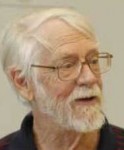 We mourn the loss of Dactyl Foundation advisory board member Angus Fletcher.
We mourn the loss of Dactyl Foundation advisory board member Angus Fletcher.
Epistemological Poetics: A Walk with Angus Fletcher by VN Alexander
In 1994, considering a course on the “Literature of Nature” at the Graduate Center of the City University New York, initially I thought it be would too pastoral for my tastes—in those days I thought I was interested in art not nature—and I almost passed it up, but the fates intervened in the form of Linda, the all-knowing and benign department secretary, who said to me, “It’s Angus Fletcher,” and, without waiting for my response, wrote my name down on the roll. In this propitious way, I was introduced to the distinguished Renaissance scholar, whose methods fitted perfectly with his subject and whose work has been, ever since, a steady spring of inspiration. In manner as well as appearance, Angus might be described, with his vibrant white hair and beard, as a classic sage. He tends to think aloud in class—about Faust’s contract or the contrapuntal voices of a fugue or Whitman—and encourages students to join in as his wanders in his mental lake country. Joan Richardson has called Angus Fletcher “a magically gifted teacher in whose presence we hear what thinking feels like.” Indeed the synesthetic experience of his poetic logic was always instructive, leading inevitably to the unforeseen vista. Memories of 1994 recall that at some auspicious point in each ninety-minute session, he would suddenly deliver an inspired oration that would leave us all physically moved. To come upon such depth and breath of erudition is to feel precisely what García López de Cárdenas must have felt when he unexpectedly came upon the Grand Canyon. Continue reading “Angus John Stewart Fletcher 1930-2016”
Marcella Faria Joins Dactyl Foundation as Researcher in Art & Science Interactions
Marcella Faria earned her MSc in Biochemistry at the University of São Paulo and her dissertation subject was the controls in mammalian cell cycle. She earned a Ph.D. in Biophysics at the Museum of Natural History in Paris, studying the artificial modulation of gene transcription. She has been a Post Doctoral fellow at The Federal University of São Paulo (Unifesp) and at the Collège de France in Paris always interested in the molecular controls of cell fate transitions. She has held a young talent grant leading her own research group at the University of São Paulo, and has been an associated researcher at the Butantan Institute in São Paulo. She contributed more than forty scientific articles in indexed journals and book chapters, edited two books, supervised students, and is on the editorial boards of Central Nervous System Agent in Medicinal Chemistry, Biosemiotics, and Cadernos de História da ciência do Instituto Butantan. In 2017 she will be joining Dactyl Foundation as a invited researcher to work on multidisciplinary projects, with special emphasis on word games in cell biology, and the various concepts of “fate” adopted during the 20th century in literary fiction and in cell biology.
Ancient Wars/Modern Vets
One of the many great events scheduled for the Millbrook Literary Festival.
In this ninety-minute illustrated presentation, Peter Meineck offers short readings from contemporary translations of ancient texts to elucidate the connections between the experience of the American veteran community and the ancient Greeks and Romans. Participants will be asked to relate their own stories to the ancient material and together will explore themes such as coming home, democracy and war, women at war, the ethics of war and the relationships between veterans and civilians.
Dactyl Director, VN Alexander, selected to be Public Scholar for the NY Council for the Humanities
VN ALexander will be available to give public lectures through the New York Council for the Humanities. Qualifying non-profit organizations in New York State can apply online at nyhumanities.org
PUBLIC SCHOLAR, NOV 2015 – NOV 2017
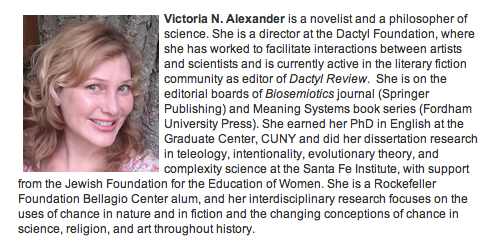
Alexander will be lecturing on the following topics: Continue reading “Dactyl Director, VN Alexander, selected to be Public Scholar for the NY Council for the Humanities”
How can art and science interact meaningfully?
Based on a talk at the Leonardo Art and Science Rendezvous (LASER) meeting in NYC, Victoria N Alexander, PhD discusses how scientists can benefit from interaction with artists. This is the second video in the “Science, Art and Biosemiotics” series, produced and directed by Lucian Rex.
This video features painting, Epiphany, 1998 by James Gilroy
Compost Modern Discussion Forum
The CompostModern forum is made up of artists, poets, fiction writers, playwrights, scientists, mathematicians, musicians, actors and any one else interested in joining. Instead of presenting formal lectures or panels, we open the floor to the community. Featured guests and audience members are able to talk freely and on equal terms about everything from beauty and meaning to pop-culture. As the name implies, the CompostModern forum aims to re-cycle our rich aesthetic history. If the project of postmodernism was to deconstruct traditions, it has left us with a fertile soil out of which new forms may emerge. It is with the belief that all new forms of art must evolve from a history that we approach the guiding question of the forum: What is creativity?
The Science of Making Choices
What happens in your body when you choose to go right or left? What makes your decisions? your Self? What do we mean by the word “choice”?
VN Alexander, PhD discusses the science of making choices from a complexity science-biosemiotic perspective. This is the first in a series of videos “Science, Art and Biosemiotics,” produced and directed by Lucian Rex.
Compost Modern Discussion Forum
The CompostModern forum is made up of artists, poets, fiction writers, playwrights, scientists, mathematicians, musicians, actors and any one else interested in joining. Instead of presenting formal lectures or panels, we open the floor to the community. Featured guests and audience members are able to talk freely and on equal terms about everything from beauty and meaning to pop-culture. As the name implies, the CompostModern forum aims to re-cycle our rich aesthetic history. If the project of postmodernism was to deconstruct traditions, it has left us with a fertile soil out of which new forms may emerge. It is with the belief that all new forms of art must evolve from a history that we approach the guiding question of the forum: What is creativity?
Toward a Biosemiotic Definition of Chance
June 2013
Lecture by Victoria N. Alexander, Director, Dactyl Foundation
International Biosemiotics Studies, 13th Annual Gathering, Castiglioncello, Italy.
(numbers refer to slides)
CompostModern Discussion Forum
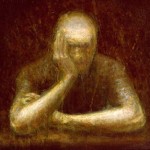 Thursday, September 27, 2012. 1-3PM
Thursday, September 27, 2012. 1-3PM
Our popular discussion forum is back! Live online! The CompostModern forum is made up of artists, poets, fiction writers, playwrights, scientists, mathematicians, musicians, actors and any one else interested in joining. Instead of presenting formal lectures or panels, we open the floor to the community. Featured guests and audience members are able to talk freely and on equal terms about everything from beauty and meaning to pop-culture. As the name implies, the CompostModern forum aims to re-cycle our rich aesthetic history. If the project of postmodernism was to deconstruct traditions, it has left us with a fertile soil out of which new forms may emerge. It is with the belief that all new forms of art must evolve from a history that we approach the guiding question of the forum: What is creativity?
Admission free. Reservation required. Write to info@dactyl.org for the meeting link.
Support Dactyl When You Make Travel Reservations or Shop Online!
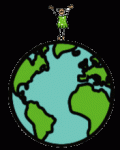 Now you can support Dactyl Foundation’s art-science programs next time you make travel reservations using any one of the major online companies, like Orbitz or Travelocity, or when you make any purchase on Amazon.com. 6% will go to Dactyl Foundation at no extra cost to you. Just use the links below to enter your favorite online site and make your reservation or purchases as you normally would, and Dactyl Foundation will receive a 6% donation. You will see the same low prices as you would if you entered these sites directly.
Now you can support Dactyl Foundation’s art-science programs next time you make travel reservations using any one of the major online companies, like Orbitz or Travelocity, or when you make any purchase on Amazon.com. 6% will go to Dactyl Foundation at no extra cost to you. Just use the links below to enter your favorite online site and make your reservation or purchases as you normally would, and Dactyl Foundation will receive a 6% donation. You will see the same low prices as you would if you entered these sites directly.
Next time you make travel reservations online, enter your favorite site through this page Hopetels.com
http://www.hopetels.com/dactyl
Next time you’re buying ANYTHING on Amazon.com, enter through this page
The Biologist’s Mistress: Rethinking Self-Organization in Art, Literature, and Nature
We have an exciting conference and art exhibition on mimicry and crypsis planned for fall 2012. Stay tuned for the call for papers. Thanks for supporting Dactyl.
The Biologist’s Mistress
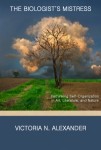 Dactyl Foundation is pleased to announce the publication of Victoria N. Alexander’s The Biologist’s Mistress: Rethinking Self-Organization in Art, Literature and Nature.
Dactyl Foundation is pleased to announce the publication of Victoria N. Alexander’s The Biologist’s Mistress: Rethinking Self-Organization in Art, Literature and Nature.
Teleology is like a mistress to the biologist; he dare not be seen with her in public but cannot live without her –J. B. S. Haldane
Drawing on her experiences as a complexity theorist, novelist and art-theorist, Victoria N. Alexander examines the history and practices of teleology, the study of purpose, in nature as well as in human behavior. She takes us “inside” paradoxically purposeful self-organizing entities (which somehow make themselves without having selves yet to do the making), and she shows us how poetic-like relationships—things coincidentally like each other or metaphoric and things coincidentally near each other or metonymic—help form organization where there was none before. She suggests that it is these chance language-like processes that result in emergent design and selfhood, thereby offering an alternative to postmodern theories that have unfairly snubbed the purposeful artist. Alexander claims that what has been missing from the general discussion of purposefulness is a theory of creativity, without which there can be no purposeful action, only robotic execution of inherited design. Thus revising while reviving teleology, she offers us a secular, non-essentialist conception of selfhood as an achievement that can be more than a momentary stay against the second law.
The book includes anecdotes about Dactyl Foundation’s artists and history. All proceeds from book sales will be donated to the foundation to help support educational programs and research in art-science.
CompostModern Discussion Forum: Fridays
 New Summer Hours 2011 4-6PM
New Summer Hours 2011 4-6PM
The CompostModern forum is made up of artists, poets, fiction writers, playwrights, scientists, mathematicians, musicians, actors and any one else interested in joining. We meet every Friday, and at least once or twice a month, we have a featured guest or two. Instead of presenting formal lectures or panels, we open the floor to the community. Featured guests and audience members are able to talk freely and on equal terms about everything from beauty and meaning to pop-culture. As the name implies, the CompostModern forum aims to re-cycle our rich aesthetic history. If the project of postmodernism was to deconstruct traditions, it has left us with a fertile soil out of which new forms may emerge. It is with the belief that all new forms of art must evolve from a history that we approach the guiding question of the forum: What is creativity?
Admission free.
Biosemiotics Conference June 21-25, 2011
The Eleventh Annual International Gathering in Biosemiotics will be held from June 21 to June 26, 2011 under the auspices of the Dactyl Foundation at the Rockefeller University for Biomedical Research in New York City, USA. Biosemiotics is an interdiscipline that seeks naturalistic understandings of metalistic phenomena, grounded in biology, and, in turn, seeks understandings of biological processes in terms of a general semiotics.
What can be learned about human semiosis, interpretation, communication, creativity and meaning-making by studying less complex but analogous phenomena in cellular signaling, chemotaxis, zoosemiotics, embryonic development, or the immune system? Can the pervasive metaphoric usages of chemical “message,” genetic “information,” and “signaling” in contemporary biology be defined more precisely by taking them literally? While human symbolic representation may be species-specific–or at least unique to unusually big-brained animals–it must have emerged out of less complex semiotic processes and proto-semiotic processes. What are the antecedents of human semiosis? And how can the exploration of these antecedents help bridge the unnatural gap between body and mind that was imposed centuries ago more for religious than scientific reasons?
All are welcome to attend. For registration information click here.
Want to learn more about Biosemiotics? Visit the International Society for Biosemiotic Studies website, or listen to ISBS Vice-President Don Favareau on BBC radio.
Call for Papers: 11th Annual Biosemiotics Gathering
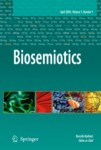 The Eleventh Annual International Gathering in Biosemiotics will be held from June 21 to June 26, 2011 under the auspices of the Dactyl Foundation at the Rockefeller University for Biomedical Research in New York City, USA. The Scientific Advisory Committee of the Eleventh Annual Gatherings in Biosemiotics welcomes paper proposals from researchers in any academic discipline who are investigating the presence and the role of sign processes in living systems.
The Eleventh Annual International Gathering in Biosemiotics will be held from June 21 to June 26, 2011 under the auspices of the Dactyl Foundation at the Rockefeller University for Biomedical Research in New York City, USA. The Scientific Advisory Committee of the Eleventh Annual Gatherings in Biosemiotics welcomes paper proposals from researchers in any academic discipline who are investigating the presence and the role of sign processes in living systems.
What is Biosemiotics? Listen to philosopher Don Favareau on BBC radio.
The call for papers is now closed. Continue reading “Call for Papers: 11th Annual Biosemiotics Gathering”
Creativity and Value: How A NonProfit Art Foundation Can Use Complex Systems Theory
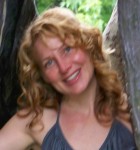 August 2010
August 2010
Adelphi University
Conference on Social Entrepreneurship
Lecture by Victoria N. Alexander, Director, Dactyl Foundation
The question everyone is interested in and the one I would like to be able to answer, at least in part, is the question of how a non-profit organization can avail itself of complex systems theory to make its complex system work in a complex world. Continue reading “Creativity and Value: How A NonProfit Art Foundation Can Use Complex Systems Theory”
CompostModern Discussion Forum: New Summer Hours
 Every Thursday 4:00 – 6:00 PM
Every Thursday 4:00 – 6:00 PM
Featured Guest Nathan Cabot Hale, Sculptor. July 29.
Nathan Cabot Hale is a sculptor, painter and author of numerous books on art, including Abstraction in Art and Nature, Creating Welded Sculpture, and Exploring the Roots of Human Emotion in Sculpture. Hale will speak about, among other things, how lines of growth and structure, water and liquid forms, weather and atmospheric patterns, luminosity, earth colors, many other elements are shown to be wellsprings of creative abstraction. Continue reading “CompostModern Discussion Forum: New Summer Hours”
Cultivator Playreading Series
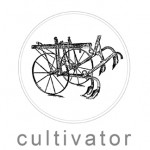 Friday, June 25, 2010 5-7 pm
Friday, June 25, 2010 5-7 pm
Open Readings with Katalina Mustatea
The aim of The Cultivator series is to give breath and voice to dramatic scripts in progress, and to act as a seedbed for new dramatic writing. The Cultivator invites thoughtful experiments with form and language, and encourages spontaneous, organic collaborations between playwrights and performers. Each script presentation will be followed by a salon-style discussion, where participants and audience can talk freely about the work presented, or else consider the broader implications of theater and performance art in our culture. Part of the weekly CompostModern Discussion Forum at Dactyl, this monthly series will follow the forum’s general scope and format. Continue reading “Cultivator Playreading Series”
CompostModern featured guest Elisa Perea
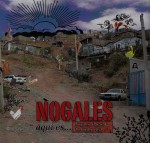 Friday, June 4, 2010 4-6PM
Friday, June 4, 2010 4-6PM
Documentary maker Elisa Perea talks about and shows clips from “Nogales aqui es…” (Nogales, this is it… the border city)
A film presenting the creative experiences of a generation of visual artists in their playground; their field of dreams…Nogales… the city. The one they see and the one they imagine… a bordertown awakened through their work… a journey via their art and testimony… offering an alternative description of a territory that is often misunderstood by both bordering countries. This project was funded by The National Council for the Arts and Culture of Mexico and by the Sonoran Institute of Culture. Continue reading “CompostModern featured guest Elisa Perea”
CompostModern Forum: featured guest Laura Otis
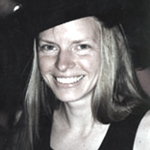 Friday May 21, 2010 4-6PM
Friday May 21, 2010 4-6PM
Laura Otis began her career as a scientist, earning her B.S. in Molecular Biophysics and Biochemistry from Yale in 1983 and her M.A. in Neuroscience from the University of California at San Francisco in 1988. Before receiving her Ph.D. in Comparative Literature from Cornell University in 1991, she worked in labs for eight years. Since 1986, she has been studying and teaching about the Continue reading “CompostModern Forum: featured guest Laura Otis”
Cultivator Play Reading Series
 Friday, April 30, 2010 5-7 pm
Friday, April 30, 2010 5-7 pm
with Katalina Mustatea, Don DiPaolo and Amy Staats
The aim of The Cultivator series is to give breath and voice to dramatic scripts in progress, and to act as a seedbed for new dramatic writing. The Cultivator invites thoughtful experiments with form and language, and encourages spontaneous, organic collaborations between playwrights and performers. Each script presentation will be followed by a salon-style discussion, where participants and audience can talk freely about the work presented, or else consider the broader implications of theater and performance art in our culture. Part of the weekly CompostModern Discussion Forum at Dactyl, this monthly series will follow the Continue reading “Cultivator Play Reading Series”
